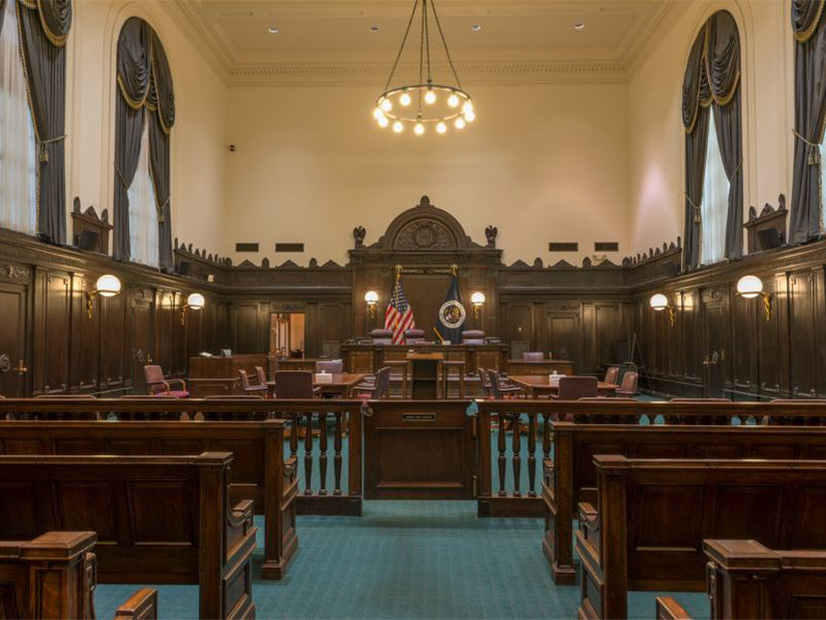A federal appeals court on Tuesday ruled that Texas’ right-of-first-refusal law violates the U.S. Constitution’s dormant Commerce Clause, giving NextEra Energy (NYSE:NEE) a glimmer of hope in its bid to build two transmission projects in the state’s non-ERCOT footprint.
The 5th U.S. Circuit Court of Appeals found that NextEra’s challenge of the 2019 law (Senate Bill 1938), applied to interstate markets and not ERCOT, should proceed beyond the lawsuit’s pleading stage. It remanded the case back to the U.S. District Court for Western Texas (20-50160). (See NextEra Appeals Court Decision on Texas ROFR Law.)
The 5th Circuit agreed with NextEra that legal precedent did not shield SB 1938 from dormant Commerce Clause. The holding of the “dormant” clause is that implicit in the Constitution’s grant to Congress of power over interstate commerce is a prohibition against states passing legislation that discriminates against such commerce, such as laws meant to protect a state’s own economy.
NextEra Energy Capital Holdings and four other NextEra transmission owner/developer entities said in their appeal that the Texas law violated the clause because it only allowed the incumbent state owners of a transmission line’s end points to build, own and operate new lines.
In rejecting NextEra’s claim in February 2020, the district court said the legislation didn’t discriminate against interstate commerce because it “regulates only the construction and operation of transmission lines and facilities within Texas.” (See District Court Dismisses Texas ROFR Repeal.)
“That is wrong for the areas of Texas that are part of interstate electricity networks,” the 5th Circuit said, pointing to SPP’s and MISO’s East Texas footprints and SPP’s service territory in the Texas Panhandle.
“SPP and MISO territory … is part of an ‘interconnected “grid” of near-nationwide scope’ that has long been subject to FERC oversight,” the court said. It noted that the commission abolished ROFR provisions in its FERC-sanctioned rate agreements with its jurisdictional RTOs and ISOs. The commission “reasoned that federal rights of first refusal might ‘be leading to rates … that are unjust and unreasonable,’ in large part because ‘it is not in the economic self-interest of incumbent[s] to permit new entrants to develop transmission facilities,’ even if those facilities ‘would result in a more efficient or cost-effective solution.’”
The court also said that the Supreme Court, in finding dormant Commerce Clause violations, does not mention in which states companies are incorporated and the fact that most of Texas’ in-state transmission incumbents are incorporated outside the state does not save SB 1938.
“A law can discriminate against interstate commerce even though most of the incumbent transmission line providers that benefit from SB 1938 are incorporated or headquartered outside Texas,” the court said. “What matters instead is that the Texas law prevents those without a presence in the state from ever entering the portions of the interstate transmission market that cross into Texas. A law that ‘discriminates among affected business entities according to the extent of their contacts with the local economy’ may violate the Commerce Clause.”
The ruling may not be enough to save NextEra Energy Transmission (NEET) Midwest’s winning competitive bid for a $130 million, 500-kV project in East Texas. The Hartburg-Sabine Junction project was awarded in 2018, but MISO said in July that planned capacity in the region had negated much of the line’s economic benefits. (See MISO on Verge of Cancelling Hartburg-Sabine Tx Project.)
NEET Southwest also applied to the Texas Public Utility Commission in 2018 to transfer ownership of 30 miles of 138-kV facilities from Rayburn Country Electric Cooperative in SPP’s East Texas footprint. That application was withdrawn in 2020 after SB 1938 became law (48071).
The appeals court said any claims related to Hartburg-Sabine Junction seem premature because NextEra never applied for a certificate of public convenience and necessity. It also said it would allow the district court to determine whether NextEra is entitled to any preliminary injunctive relief by suspending the ROFR while the case is pending.
It would then be up to NextEra to seek a permanent order eliminating the ROFR. NextEra did not respond to a request for comment by press time.
The 5th Circuit’s ruling lists all five Texas PUC commissioners as defendants and appellees, though none of them held their seats when NextEra filed its appeal. A PUC spokesperson said staff are reviewing the decision with its attorneys.
“The commissioners justify SB 1938’s incumbency requirement as a law that promotes the safety and reliability of the electricity grid by ensuring that only those with a track record of building transmission lines in Texas can build new lines,” the 5th Circuit said. “That may end up justifying the discrimination against out of-state interests, but it does not avoid the conclusion that the law discriminates. Limiting competition based on the existence or extent of a business’s local foothold is the protectionism that the Commerce Clause guards against.”
Circuit Judge Jennifer Walker Elrod concurred with much of the majority’s opinion, noting the decision applies only “to the interstate electricity networks in Texas (but not the intrastate ERCOT network)” controlled by MISO and SPP. However, she dissented from the conclusion that SB 1938 “discriminates on its face” against interstate commerce.
“The distinction between incumbents and non-incumbents in SB 1938’s text, without more, does not constitute facially discriminatory treatment of out-of-state entities,” Elrod wrote. “That something more would have to be evidence of discriminatory purpose or discriminatory effect. And as the majority stated, the ‘pleadings-stage dismissal of [the discriminatory-purpose and discriminatory-effect] claims was premature. Claims that turn on intent and effects typically require factual development.
“On remand, I have no doubt that the able district court will carefully analyze these thorny issues,” she concluded.




